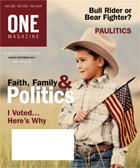
August-
September 2012
Faith, Family &
Politics
------------------
|

intersect, where the bible meets life
Judging "Judge Not" Part Two
“You shouldn’t judge!” That’s the criticism we often get when we offer a differing opinion about what someone says or does. Of course, the person making that charge is himself “judging” our comment that is, in his view, “judging.”
That’s just one of the implications which arise from taking Matthew 7:1 out of context. When you do so, the passage indicts everybody for saying anything about everything! Here, Jesus mandates, “Judge not, that you be not judged.” Last month we determined that Jesus is not talking about merely forming and voicing opinions, or making informed choices based on ethical or logical principles. Instead, He prohibits a harsh, condemning spirit that feels free to speak evil of others.
Collateral Damage
When we are guilty of making mean-spirited, hurtful comments to or about people, several implications present themselves as unintended consequences. In the first place, when we are abusive and judgmental in this sense, we face judgment ourselves: “ . . .that you be not judged,” warns Jesus. Our bitter words may come back to us from those we condemn, directly or indirectly. Or we may understand Jesus’ caution as indicating that by this kind of “judging,” we are doing what God alone has the right to do, and in this way we ourselves commit sin. Without question, we betray our roles as His disciples by failing to love one another when we attack fellow believers with harsh words.
Another fallout of evil speaking is the obvious conclusion that we are not treating others the way we would prefer they treat us (see Matt. 7:2). Notice again that Jesus is not forbidding His followers from using discernment in making choices. What He is insisting, however, is that we evaluate based on the standard we want others to use in evaluating us. This point is precisely that of Luke 6:37-38, which assures us that if we forgive, we will be forgiven.
Jesus’ parable about the unforgiving servant in Matthew 18 illustrates the lesson. The servant, whose boss had forgiven his enormous debt, was unwilling to apply the same standard of forgiveness to a fellow servant who owed him a pittance. It’s like a kid on a Little League team whose dad is the coach. The player makes an error or strikes out, and the coach says, “That’s okay, son.” But when another kid does the same, the coach benches him! Or the dad may be harder on his son or daughter than on the other player. Either way, he applies a different standard of “judging.”
Eye Trouble
The Lord’s admonition also instructs us to judge ourselves before we judge others. Before we give our take on a brother’s need, we’d better deal with our own. Jesus illustrates with an example that no doubt made His listeners chuckle. “Take the log out of your eye so you can see that speck of dust in his eye,” the Lord chides. I well remember driving home from church one Sunday amazed that my neighbor could let his grass get so out of control without mowing it. My wife then punched me in the side as we drove into our driveway. “Uh, what about your grass?” came her not-so-subtle rebuke at the sight of my nearly knee-high stand. Ouch!
Here are a few other applications growing out of Jesus’ words.
-
One reason this condemning spirit is wrong is because often it is not really “judging” at all; it is pre-judging. We already have our minds made up that we are “against it” without first weighing the facts. The Lord also counsels us not to judge by appearance, but to “judge with right judgment.” Evaluate carefully, even prayerfully, before you form an opinion.
-
We should be able, as brothers and sisters, to share valid concerns (though they may be simply opinions) with each other in a spirit of Christian love. But we should be willing to change our opinions if need be when we are confronted with truth. Strong opinions may be appropriate, but only if we subject them to the authority of biblical truth.
-
We must be careful about what we make absolutes in practice. An absolute leaves no room for disagreement if we accept the authority of Scripture. Some practices are simply not open-ended to change with the winds of culture. But non-absolutes can (and should) be subject to scrutiny, flexibility, even revision as we deem appropriate.
-
One absolute needing renewed attention is the commitment to live right by the principles of holiness taught in the Bible. Even within that commitment, though, there must be some degree of flexibility, or we will violate that very Word by being rigid isolationists and/or extreme legalists.
-
Even if we disagree on some of the “non-absolutes,” there is no place in the church for a bitter, harsh, condemning spirit that damages another Christian’s reputation. Matthew 7:12 is the benchmark for this entire context: “So whatever you wish that others would do to you, do also to them.”
None of us have received the final verdict. The last chapter is yet to be written. People can and do change for the worse, and we’d better be ready to help them, to correct them in meekness. But they can and do change for the better, and we need to accept them and love them as Christ does.
Intersect: Where the Bible Meets Life is a regular column written by Dr. Garnett Reid, a member of the Bible faculty at Welch College. Visit his blog: www.garnettreid.com.
|
|

